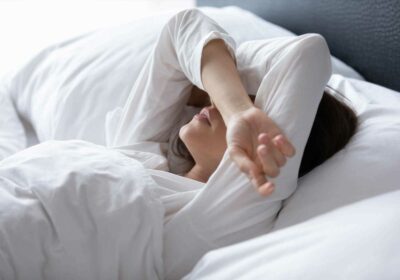What your dreams reveal about your anxiety and the themes to look out for | The Sun

GETTING to sleep can be hard work – especially for those who suffer with anxiety.
It can leave your head spinning as you try and enter the land of nod, and many are likely to suffer sleepless nights.
But experts have now revealed that your dreams could hold the key when it comes to measuring your levels of anxiety.
Medics at the University of Düsseldorf said those who suffer are likely to have different dreams to people who don't experience the condition.
Writing in the journal Dreaming, the gurus found that there were three distinct themes present in those with anxiety.
The most common were emotionally intense dreams, speed imagery and dreaming of a former partner or love interest.
Read more on dreams
I’m a dream expert and here’s what the 4 most common nightmares mean
I’m a dreams expert – here’s what 10 common dreams really mean
Other frequent dreams included being chased or attacked, being frozen with fright, or accidents such as plane crashes.
The experts also found the participants with anxiety were less likely to have positive interactions with others they come across in their dreams.
Lead author and psychologist Anton Rimsh said their findings show that people living with anxiety have 'intense dreams'.
He said: "We can assume that the presence of an anxiety disorder instigates a higher overall subjective intensity of dream experiences and dream imagery.
Most read in Health
HIDDEN SIGNSHow to spot when your cough could be a sign of the UK’s deadliest cancer
We suffered 5 miscarriages but £12,000 treatment gave us our miracle baby
I'm a nutritionist – here's 10superfoods for £1 or less to boost your health
Urgent warning to any parents taking their kids to playgrounds this summer
"In accordance with this notion, we concluded that the dream contents in anxiety patients not only exist in large numbers, but also are experienced by them with a particularly high subjective intensity and emphasis."
The experts analysed data from two different groups of people.
There were 38 people in each group, with one group having anxiety and the other not.
Medics tracked the participants through the use of dream diaries, along with questionnaires and one-on-one dream analysis.
When the information was gathered experts then compared the two sets of results.
They also found that people with anxiety also experienced more negative emotions during their snooze.
These included feelings of anger, fear and sadness.
The symptoms of anxiety you need to know
According to Anxiety UK, the signs of anxiety can be divided into physical and psychological symptoms.
You may not experience all of them, but physical symptoms include:
- Racing heartbeat
- Shortness of breath
- Chest tightness
- Dry mouth
- Butterflies in stomach
- Nausea
- Urge to pass urine/empty bowels
- Tremor
- Sweating
- Pins and needles
Meanwhile, the psychological symptoms include:
- Inner tension
- Agitation
- Fear of losing control
- Dread that something catastrophic is going to happen (such as blackout, seizure, heart attack or death)
- Irritability
- Feelings of detachment
The symptoms of panic attacks can feel similar to a heart attack – as they often involve rapid breathing, chest pains and pins and needles
Many people suffer with anxiety and it's thought that five per cent of all Brits suffer from a generalised form of the illness.
Feelings of anxiety can be completely normal, but some can struggle with their worries.
There are also a number of different types of anxiety disorder, from generalised anxiety to obsessive compulsive disorder, specific phobias and panic disorders.
Some people may suffer from more than one type of anxiety disorder – for example, people with a specific phobia might experience panic as a result.
As with any mental health condition, people often feel isolated, alone and ashamed of how they are feeling – concerned that they are the only person in the world to struggle in this way.
If you know someone has said that they suffer from anxiety – or you suspect they do – the best thing you can do it be there for them.
Read More on The Sun
Tesco is giving away free beer after Euros win – how to claim
I’ve found the most flattering swimsuit for women with mum-tums from Shein
Make sure they know they are loved and cared about.
Tell them that you want to help and support them, that you release this process could take a long time but that you are willing to wait.
Source: Read Full Article








